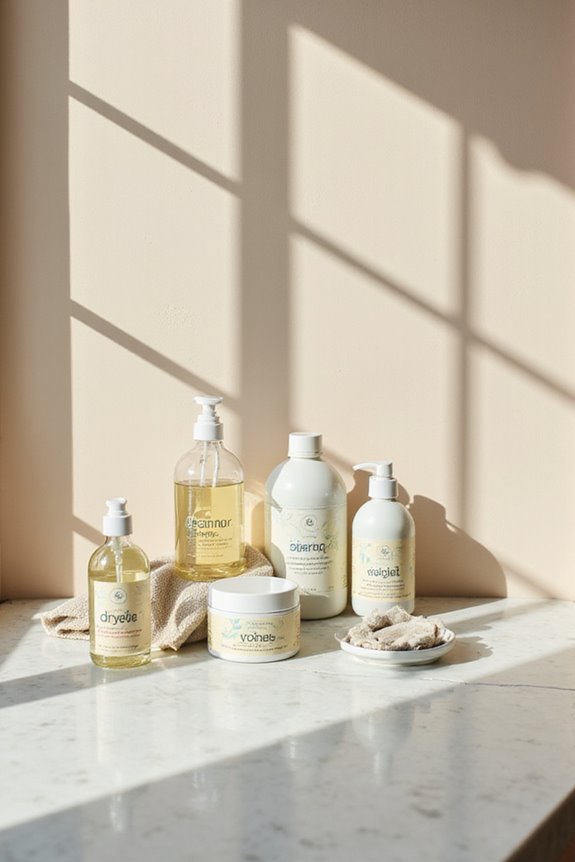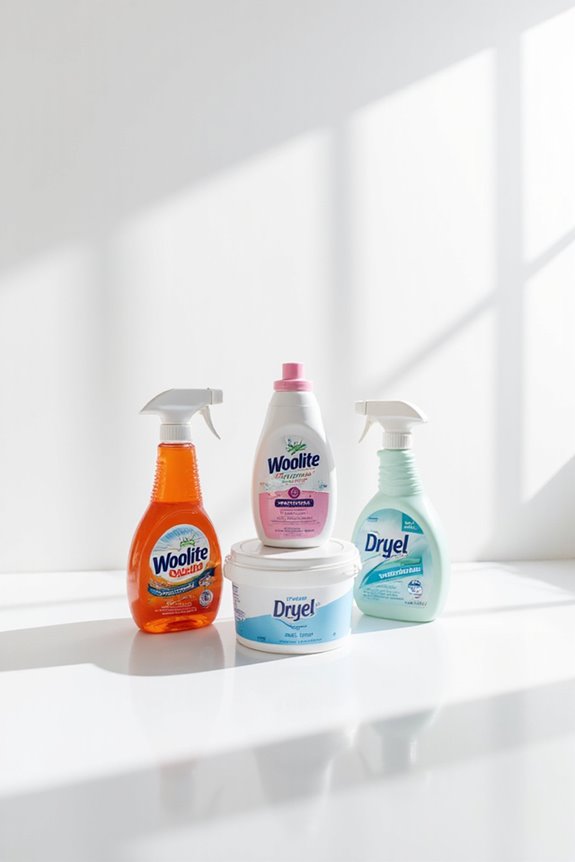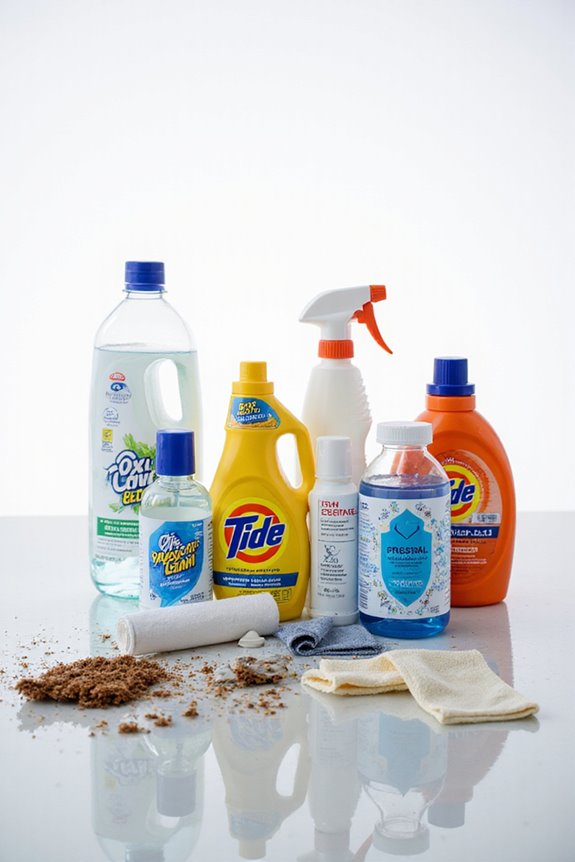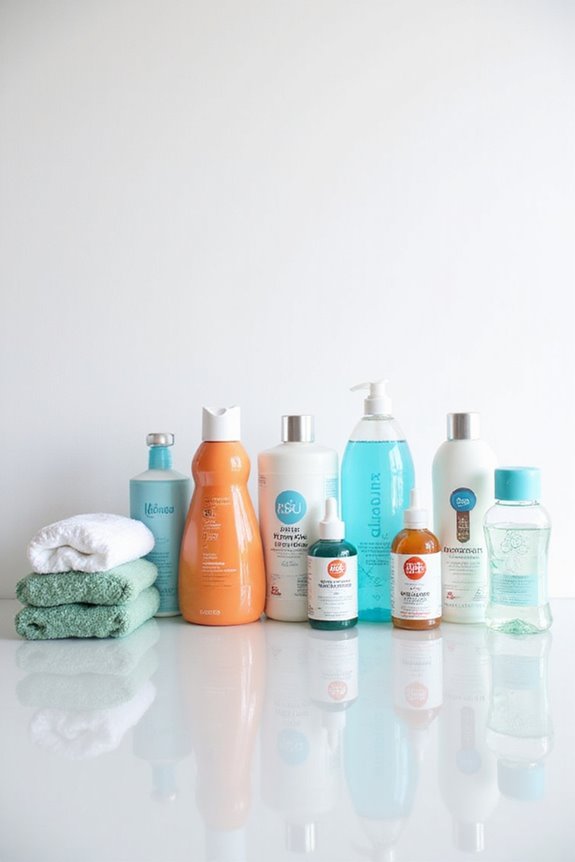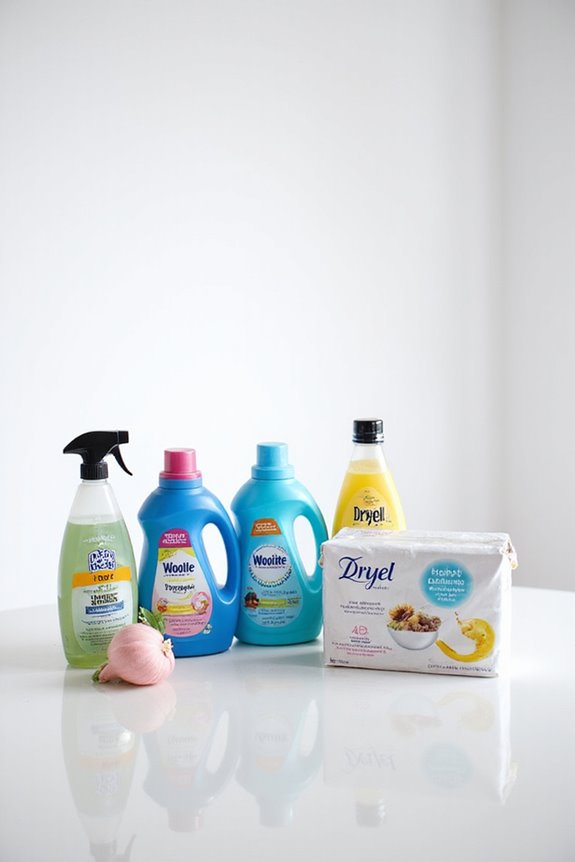Are natural stain removers effective? Well, we’ve tried them, and they can work wonders with simple ingredients like baking soda and vinegar. They’re eco-friendly and safe for kids and pets, which we love. However, they might not tackle stubborn stains as quickly as commercial products. For instance, oil-based stains can be tricky. It’s all about finding the right balance between safety and effectiveness. Stick around, and we’ll share some great tips and tricks!
Key Takeaways
- Natural stain removers can be effective for various stains using ingredients like baking soda, vinegar, and hydrogen peroxide.
- They are eco-friendly and safe for children and pets, reducing exposure to harsh chemicals.
- Effectiveness varies by stain type; they excel with protein-based and plant-based stains but struggle with tougher stains like engine oil.
- Natural solutions may require more time and multiple applications compared to commercial products for satisfactory results.
- Performance can be inconsistent across different materials, making them less reliable than specialized commercial stain removers.
Effectiveness of Natural vs. Commercial Stain Removers
When it comes to tackling tough stains, we often find ourselves weighing the options between natural and commercial stain removers. Natural stain efficacy can be impressive, especially with ingredients like baking soda and apple cider vinegar, which work wonders on oxidizable stains. However, we’ve noticed that commercial product reliability often delivers quicker results, especially for oil-based stains that can leave us scratching our heads.
While natural options are eco-friendly and safe for our kids and pets, they can require more time and effort. We’ve spent hours treating stains with homemade solutions, wishing for the instant gratification that commercial products provide. In the end, it all boils down to our cleaning priorities—are we after effectiveness, safety, or convenience? Additionally, the versatility of baking soda makes it a popular choice among users seeking effective stain removal solutions.
Mechanisms Behind Natural Stain Removal
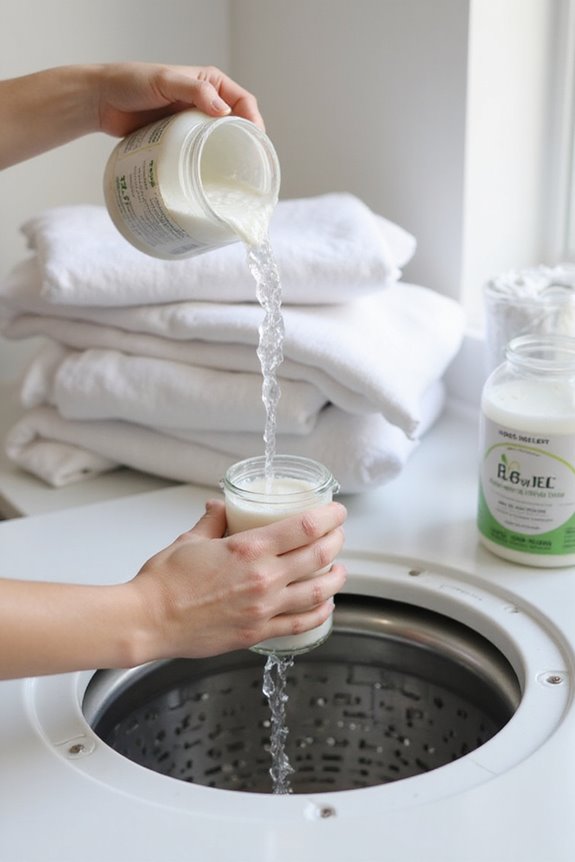
Natural stain removal might sound like magic, but there’s real science behind it. Enzymes play a vital role, showcasing what we call enzyme specificity. They target specific stain components—proteases tackle proteins, while lipases go after fats. This means stains are broken down into smaller pieces, making them easier to wash away.
Then we have surfactant action, which helps lift oil and grease stains. Surfactants create micelles, tiny spheres that trap those pesky oils, allowing them to dissolve in water. This process makes it easier to separate stains from fabric. Overall, these natural mechanisms work together to gently and effectively clean our clothes, keeping them looking fresh without harsh chemicals. Who knew science could be so handy in the laundry room? Additionally, using eco-friendly solutions ensures that cleaning your clothes is safe for both your family and the environment.
Environmental and Health Benefits of Natural Stain Removers

As we look for ways to keep our clothes clean without harming the planet, it’s exciting to discover the perks of natural stain removers. These eco-friendly options often use biodegradable, plant-based ingredients, which break down safely and support a healthier environment. Switching to natural products also aligns with our growing consumer preferences for sustainability. We can reduce pollution risks to our water and soil, making a positive sustainability impact. Plus, by avoiding harsh chemicals, we’re not just protecting wildlife but also reducing health risks for ourselves. It’s a win-win! So, when stains happen, let’s reach for those natural alternatives—our planet and our health will thank us. Plus, who doesn’t love a good baking soda hack? Additionally, many of these products are certified hypoallergenic options, ensuring safety for sensitive skin while effectively tackling tough stains.
Effectiveness by Stain Type
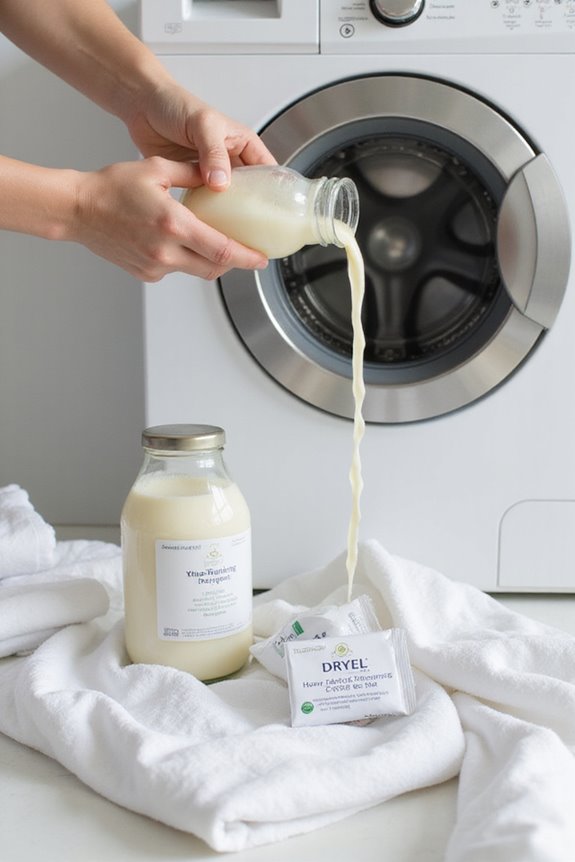
Stains can seem intimidating, especially when they ruin our favorite clothes. When tackling protein-based stains like blood or sweat, natural removers can be moderately effective. We’ve found that hydrogen peroxide does wonders, breaking down those stubborn stains without harming delicate fabrics. For plant-based stains, acidic solutions like lemon juice and vinegar excel in breaking down tannins. Oil-based stains? Castile soap is our go-to; it’s great for emulsifying grease. Dye stains, however, are tricky. While natural remedies like vinegar and baking soda can help reduce intensity, they often need stronger chemical action for complete removal. So, while natural stain removal techniques are eco-friendly and gentle, they may require a bit of patience and persistence on our part! Additionally, enzyme-powered detergents are particularly effective on protein stains due to their ability to break down organic matter.
Limitations and Performance Gaps

While we love the idea of using eco-friendly options to tackle stains, it’s important to recognize that natural stain removers come with some limitations. For tougher stains, like engine oil or grease, we might find that these user alternatives just don’t cut it. Our experiences show that natural remedies often require more time and effort, with multiple washes and scrubbing just to see partial results. Plus, some natural ingredients can even harm delicate fabrics. We’ve learned that while DIY methods might work on lighter stains, they often leave behind pesky marks. Inconsistent performance across different materials means we can’t always rely on them like we do with commercial products. So, while they’re great in theory, we need to manage our expectations. Additionally, certain stains such as blood and sweat may require specific treatments for effective removal, highlighting the importance of choosing appropriate solutions.
Practical Recommendations for Use
When tackling stains with natural removers, we’ve found that preparation is key to success. First, let’s talk ingredient ratios. Accurate measurements, like mixing one part vinegar with two parts water, make a big difference. We also recommend mixing ingredients just before application to boost their effectiveness.
For application techniques, we’ve learned that immediate treatment works best—don’t wait! After applying the solution, let it sit for about 5-15 minutes. Gentle agitation with a soft brush helps lift the stain without damaging the fabric. Always rinse thoroughly afterward to remove residue. Additionally, using enzyme stain removers can enhance your cleaning efforts as they target specific stain types for better results.
And remember, testing on a hidden fabric area first is a must. It saves us from unexpected surprises—like a stain that turns into a different color!
Popular Natural Ingredients for Stain Removal
Finding the right natural ingredients for stain removal can make a world of difference in our laundry routine. One of our go-tos is white vinegar. Its vinegar benefits include dissolving stains and neutralizing odors, making it a must-have. We just dilute it with water, apply it, and blot before washing. Then there’s baking soda, our trusty sidekick. It’s a mild abrasive that lifts grease and sweat stains. We often sprinkle it directly on stains or mix it into a paste. For tougher stains, we might even combine baking soda with vinegar for a cleaning powerhouse. These simple ingredients are non-toxic, inexpensive, and make laundry feel a lot less like a chore. Let’s tackle those stains together!
Comparing Cost-Effectiveness of Natural and Commercial Options
Choosing between natural and commercial stain removers can feel overwhelming, especially when we consider costs and effectiveness. In our cost analysis, natural options like vinegar and baking soda often come out cheaper. They’re pantry staples, after all! On the flip side, commercial stain removers can range from $0.59 to $0.81 per ounce. While they might cost more upfront, their concentrated formulas may save us money in the long run.
However, let’s be real: we sometimes need multiple applications with natural methods, which can add time and indirect costs. So, in our price comparison, the effectiveness of commercial products shines on stubborn stains. Ultimately, it’s about balancing our budget with what works best for our laundry adventures!
Frequently Asked Questions
How Do Natural Stain Removers Compare in Scent to Commercial Options?
When we compare scent profiles, natural stain removers often feature mild, plant-derived aromas from essential oils, while commercial options use intense synthetic fragrances. We appreciate the fresh, subtle scents that align with eco-friendly ingredient sources.
Are There Any Allergens in Common Natural Stain Remover Ingredients?
Like a garden, our choices in natural stain removers can harbor allergen sources. We must navigate ingredient sensitivities carefully, as essential oils and soaps may trigger reactions, reminding us to tread lightly in our cleaning endeavors.
Can Natural Stain Removers Be Used on All Fabric Types?
When considering fabric compatibility, we’ve found that natural stain removers work well on many fabrics, but stain specificities matter. Some stains may require different approaches, especially on delicate materials. Testing is always a good idea!
What Is the Shelf Life of Homemade Natural Stain Removers?
When we consider homemade recipes, their shelf life typically lasts 2-3 months if stored properly. Following storage tips like refrigeration and using airtight containers can help extend their effectiveness for tackling stubborn stains.
Do Natural Stain Removers Require Special Storage Conditions?
Natural stain removers do require special storage conditions. We should keep them at appropriate storage temperatures to maintain ingredient stability, ensuring their effectiveness lasts longer and preventing any degradation from light or air exposure.

